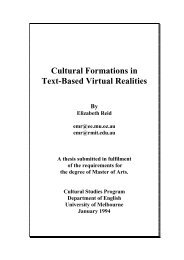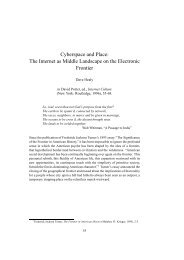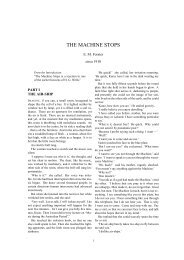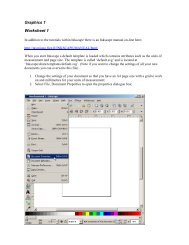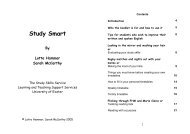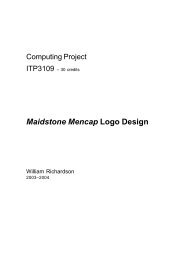PDF - The Metaphysics of Virtual Reality - University of Exeter
PDF - The Metaphysics of Virtual Reality - University of Exeter
PDF - The Metaphysics of Virtual Reality - University of Exeter
Create successful ePaper yourself
Turn your PDF publications into a flip-book with our unique Google optimized e-Paper software.
pening. On the path <strong>of</strong> life, a finite being cannot see clearly the things that remain<br />
behind on the path or the things that are going to happen after the next step. A divine<br />
mind, on the contrary, oversees the whole path. God sees all the trails below, inspecting<br />
at a single glance every step traveled, what has happened, and even what will happen<br />
on all possible paths below. God views things from the perspective <strong>of</strong> the mountaintop<br />
<strong>of</strong> eternity.<br />
Human knowledge, thought Leibniz, should emulate this visio dei, this omniscient<br />
intuitive cognition <strong>of</strong> the deity. Human knowledge strives to know the way that a<br />
divine or an infinite Being knows things. No temporal unfolding, no linear steps,<br />
no delays limit God’s knowledge <strong>of</strong> things. <strong>The</strong> temporal simultaneity, the all-atonce-ness<br />
<strong>of</strong> God’s knowledge serves as a model for human knowledge in the modern<br />
world as projected by the work <strong>of</strong> Leibniz. What better way, then, to emulate God’s<br />
knowledge than to generate a virtual world constituted by bits <strong>of</strong> information? To such<br />
a cyberworld human beings could enjoy a God-like instant access. But if knowledge is<br />
power, who would handle the controls that govern every single particle <strong>of</strong> existence?<br />
<strong>The</strong> power <strong>of</strong> Leibniz’s modern logic made traditional logic seem puny and inefficient<br />
by comparison. For centuries, Aristotle’s logic had been taught in the schools.<br />
Logic traditionally evaluated the steps <strong>of</strong> finite human thought, valid or invalid, as<br />
they occur in arguments in natural language. Traditional logic stayed close to spoken<br />
natural language. When modern logic absorbed the steps <strong>of</strong> Aristotle’s logic into<br />
its system <strong>of</strong> symbols, modern logic became a network <strong>of</strong> symbols that could apply<br />
equally to electronic switching circuits as to arguments in natural language. Just as<br />
non-Euclidian geometry can set up axioms that defy the domain <strong>of</strong> real circles (physical<br />
figures), so too modern logic freed itself <strong>of</strong> any naturally given syntax. <strong>The</strong> universal<br />
logical calculus could govern computer circuits.<br />
Leibniz’s "electric language" operates by emulating the divine intelligence. God’s<br />
knowledge has the simultaneity <strong>of</strong> all-at-onceness, and so in order to achieve a divine<br />
ac-<br />
95



